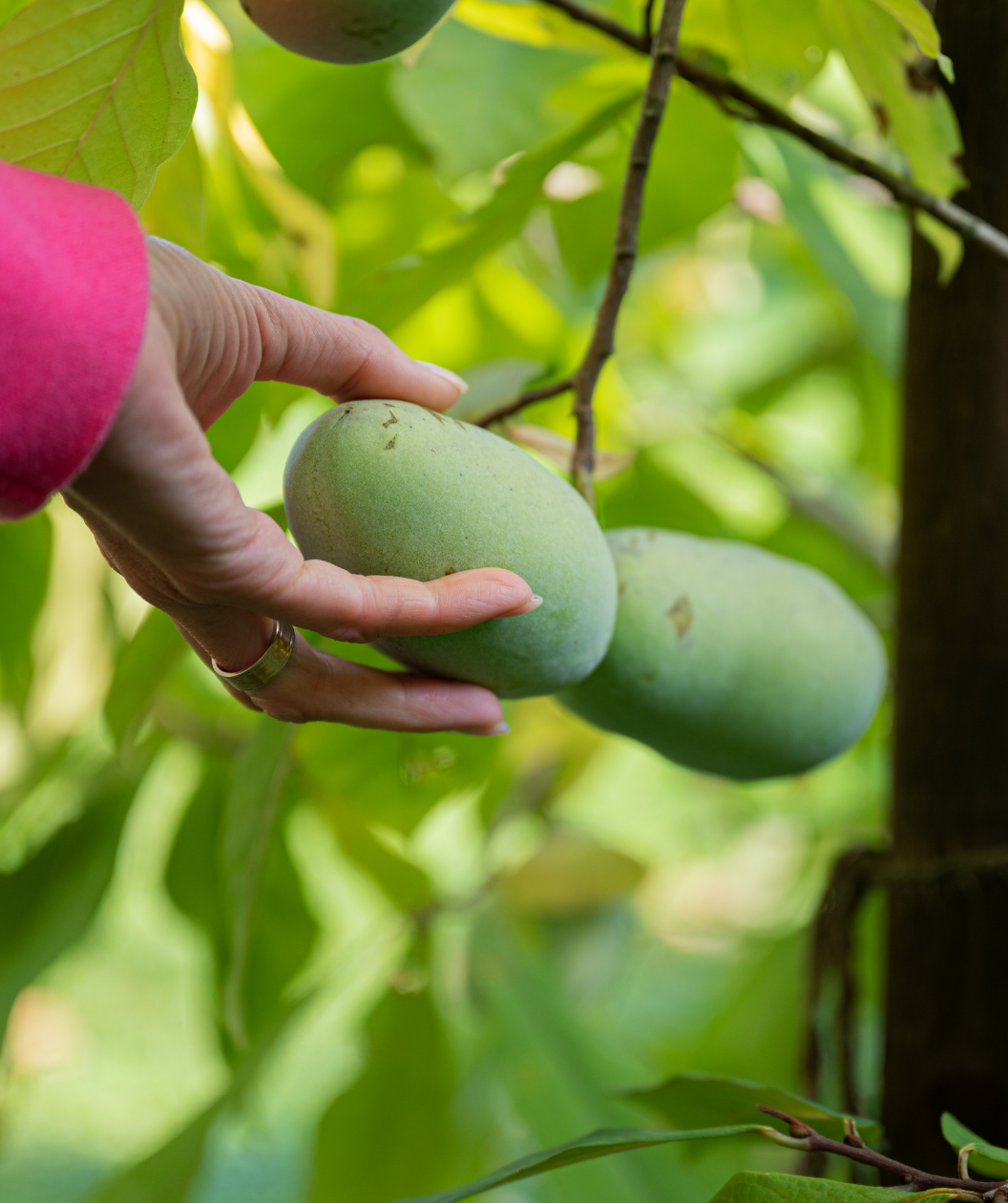






EARLY HARVESTING TROPICAL FRUIT
FEATURES:
- Rich sweet pawpaw fruit harvest earlier than other varieties in early
- September Pawpaw fruit taste like an almond custard In spring, dark red blossoms bloom, maturing into fruit by fall, when the leaves begin to change bright yellow.
- Add tropical appeal in your landscape
- Pawpaw trees need a pollinating partner to help it fruit
- Hand Selected, Fresh from the Grower
- Ships on our trucks because of the size of the tree - does not fit in a box
Growth Facts
- Hardiness Zone: 5-9
- Mature Height: 20-30' tall
- Mature Width: 20-30' wide
- Exposure: Full Sun/Part Shade
- Spacing: 20-40' apart
EARLY HARVESTING TROPICAL FRUIT
FEATURES:
- Rich sweet pawpaw fruit harvest earlier than other varieties in early
- September Pawpaw fruit taste like an almond custard In spring, dark red blossoms bloom, maturing into fruit by fall, when the leaves begin to change bright yellow.
- Add tropical appeal in your landscape
- Pawpaw trees need a pollinating partner to help it fruit
- Hand Selected, Fresh from the Grower
- Ships on our trucks because of the size of the tree - does not fit in a box
Growth Facts
- Hardiness Zone: 5-9
- Mature Height: 20-30' tall
- Mature Width: 20-30' wide
- Exposure: Full Sun/Part Shade
- Spacing: 20-40' apart
Why plant Allegheny® Pawpaw?
The precocious pawpaw! Allegheny® Pawpaw is one of the earliest pawpaw trees to ripen, coming into peak picking season in the beginning of September and one of the most unique plants you could grow in your backyard. You'll feel like you're on a tropical vacation just stepping out into your garden! A flavorful fruit that smells just as good as they taste with a hint of citrus. The fruit may be smaller, but its productivity is more than abundant! This exquisite tree has a massive covering of large drooping, so dense it feels like you're in the rainforest as you search for the clusters of fruit hidden within the branches. Pick one right off the tree this fall in your own family orchard!
"Way down yonder in the Pawpaw patch..." so goes the old folk song celebrating this beloved native plant, which has a long history in America. Pawpaw was valued in ancient times by Native Americans, and the delicious fruits later nourished European settlers and explorers like Lewis and Clark. Humans aren't the only ones who delight in this yummy fruit treat—wildlife love pawpaws, too. The foliage feeds the young of the dazzling white, black, and red zebra swallowtail butterfly. Pawpaw is the ONLY thing that zebra swallowtail caterpillars will eat, which is reason enough to grow this splendid tree.
How to use Allegheny® Pawpaw in the landscape?
Allegheny® Pawpaw is a highly productive Pawpaw variety that produces very flavorful fruit. The fruit produced from Allegheny® is the earliest ripening out of all Pawpaw varieties and produces one of the largest fruits. Before the growth of fruit, look for Pawpaw’s attractive flowers in mid-to late spring. These thick-textured, triangular, burgundy-colored blooms are primitive from a botanical standpoint. Exuding a very faint musky scent, they are meant to attract beetles and flies for pollination instead of bees. It isn’t clear whether or not a single Pawpaw Tree can pollinate itself, but planting two different trees will ensure cross-pollination, promoting optimum fruit set in fall.
Planting Zones
Hardiness Zone: 5-9
How To Plant Allegheny® Pawpaw
Pawpaw’s home in the wild is at forest edges or in the woodland understory, and it appreciates similar conditions in the landscape. It is happiest in a site with rich, organic-laden, well-drained soil and a generous layer of mulch. It flourishes in the shade but will tolerate full sun if it is shaded for the first few years and if regular irrigation can be provided. This tree doesn’t like constantly soggy soil, but it doesn’t like to dry out, either. Suckers may appear around the tree—this is simply Pawpaw’s natural growth habit. You may pull or mow off the suckers to maintain the tree as a single-trunked specimen, or you may let them grow to allow a Pawpaw patch of your own to form.
How To Water
Water twice weekly for the first 3-5 weeks; then water weekly for the remainder of the year until winter. When you water, water slowly and thoroughly. Watering needs may be altered due to extreme weather conditions.
How To Fertilize
Incorporate Elements Starter Plant food granular form into the soil when planting. If planting in spring or summer start fertilizing late fall using Elements Starter Plant food granular form on an annual basis each late year. Continue this for three years to get your plant well established.
How To Prune
How Does Shipping Work?
Bower & Branch Trees, the real BIG trees, don’t fit in a box! Our big trees, sizes XL and bigger, require expert delivery and care, that means our extra-large trees are shipped on Bower & Branch trucks. We are the only ones who know how to ship our big and bigger trees and plants with tender loving care. We deliver your trees and plants directly to you. Ask Bower & Branch about planting services – we'd be happy to assist in installation.
*For Big trees and Shrubs, Size XL and bigger: Review our Seasonal Shipping Timelines and Policy here.
Your trees and plants are grown across the United States at various Bower & Branch Growers. Depending on your location, your plant orders may be shipped from various locations. Please expect orders with multiple items to be delivered over a number of days as a result. Orders made up of numerous items or selections will not arrive at your home on the same day.
Shipping Delays:
From time to time, Bower & Branch Growers may determine to delay order shipment based on various factors for plant health. Weather in your region, as well as, where your plants are grown, is always considered when shipping. Extreme weather conditions may delay some or all of your order. Bower & Branch allows our Growers to make final shipping decisions based solely to benefit your trees and plants’ health and success.
How Does Sizing Work?
The size of our trees have nothing to do with the container size like you may find elsewhere–big doesn't mean just height - it’s also vigor, age, and overall health. Other online retailers are going to tell you that a plant is a seven gallon, that means nothing to your tree or plant (or you.)
Our trees for sale online are graded on large, x-large, and even bigger sizes. This is because our trees are sized by their age—the higher the letter, the more mature the tree. The age determines the trees’ overall height, size of the trunk and the overall branch density.
All of these characteristics are what you should be looking for when choosing a tree for immediate impact and instant curb appeal. Our extra-large tree and plant sizes are sure to wow you and your neighbors!
See the size guides below.






Our Guarantees
3-YEAR-TREE GUARANTEE:
Bower & Branch offers a Three-Year Tree Guarantee on all of our trees, sizes X-Large and up. Only the finest and the most experienced growers are awarded the opportunity to grow for Bower & Branch, so we offer the best guarantee available.
If your tree(s) should fail for any reason during the three-year guarantee period, you will receive an online gift card in the amount that you originally spent on the tree.* You can then use this online gift card for any Bower & Branch Purchase.
* Bower & Branch provides online gift cards in the amount of the original purchase price of the tree(s). The amount does not include any additional costs such as delivery, planting, tax, or any other products or services. Online gift cards can be applied towards any Bower & Branch purchase on BowerandBranch.com and have no expiration dates. Bower & Branch does not guarantee tree replacement or availability of any desired product at any time. Cash refunds are not offered. Bower & Branch requires that all original tags and receipts are present when a guarantee request is initiated. The Bower & Branch Three-Year Guarantee only applies to plant material that has been planted in the ground. Container plantings are NOT covered.
At Bower & Branch, we do our best to honor all guarantee fulfillment requests to ensure customer satisfaction. However, we reserve the right to refuse the request if the required guarantee steps were not satisfied. Bower & Branch also reserves the right to deny any guarantee fulfillment request that is made as a result of animal damage, problems with plant hardiness and zone issues, or acts of nature (snow storms, hurricanes, and similar).
Reach out to a Plant Whisperer with any questions:
- Email: plantwhisperers@bowerandbranch.com
- Phone: 866-873-3888
- Or via Online Chat





